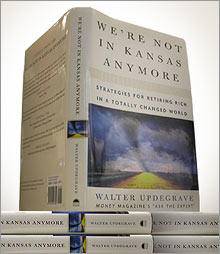|
|

|
|
More information on Updegrave's new book.
|
|
|
|
|
NEW YORK (CNN/Money) -
I'm 28, single and make $66,000. I'm thinking of buying a house to save on taxes. What else can I do to pay as little tax as possible?
�James, Baltimore, Maryland
First, I'd like to address the first part of your strategy -- buying a house to save on taxes. I know it may sound like heresy, but I don't think someone should buy a house primarily for tax benefits.
In fact, I'll go even further. I also don't think someone should buy a house primarily because they think it's a good investment, period. Your primary motivation for buying a house, in my opinion, ought to be that you actually prefer living in a house you own rather than an apartment or a house that you rent.
Why do I espouse such blasphemy at a time when buying a home seems like the sure road to riches?
Well, for one thing, that route may not be as sure as it seems. In the past, when prices have been bid up by frenzied buyers the way they've apparently been in some areas of the country, a setback has often followed. After huge runups in the mid- through late-1980s, house prices declined by 10 percent or more in some West Coast cities and didn't regain their previous highs until the 1990s were more than half over. Some East Coast cities experienced a similar slide.
I'm not predicting we're on the verge of a repeat of this scenario. I consider calling tops in the housing market as futile an exercise as calling tops in the stock market. That said, I think a sustained period of stagnant prices or even outright declines are a distinct possibility in some overheated markets in the not too distant future, particularly if mortgage rates begin climbing.
Of course, you would still be reaping the tax benefits of owning the home -- the mortgage interest deduction, the property tax write off and, eventually, the exemption of up to $250,000 ($500,000 for couples) in home-sale gains, assuming there are gains and that you meet the criteria for the exclusion. (For details, check out Publication 523: Selling Your Home at the IRS Web site.)
But these benefits too could lose their luster if you end up living in an asset whose value stagnates or heads south. At the very least, you would have to consider whether you would have been better off simply renting and freeing up more cash for other investments that, even after paying taxes, might have resulted in a bigger gain.
As for other ways of "paying as little tax" as possible, I again urge caution.
I have no problem with reasonable measures like contributing as much as possible to 401(k)s and IRAs and, if you have self-employment income, SEP-IRAs or Keoghs. All these are easy enough to do and have rather straightforward benefits.
But sometimes people who make lowering their tax bill their overriding goal end up making ill-informed investment decisions -- like investing too much of their wealth in real estate because of the deductions that investment real estate can generate -- or even getting involved in ill-conceived schemes that can backfire such as messy limited partnerships.
With an income of $66,000, I don't see much need or benefit in trying to get too exotic. Just focus on maxing out contributions to tax-advantaged retirement savings plans and, perhaps, look for ways to take advantage of today's relatively low tax rate on capital gains, which you can do by buying and holding good growth stocks or investing in tax-managed mutual funds that minimize taxable distributions or even plain old index funds. If you manage to do both of these things over the next 10 to 20 years, you'll trim your tax bill but, even more important, you'll build your wealth.
See my recent column on tax-efficient mutual funds.
4 questions before buying a home.
For a recent study that tries to determine which housing markets are overheated, underheated or just right, click here.
See housing prices and gains for more than 100 markets.
Walter Updegrave is a senior editor at MONEY Magazine and is the author of "We're Not in Kansas Anymore: Strategies for Retiring Rich in a Totally Changed World."

|